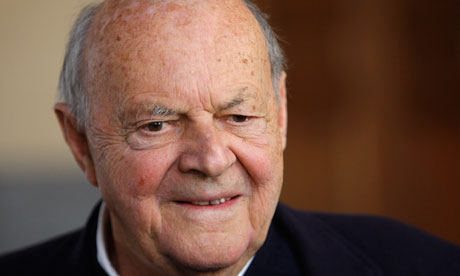quarta-feira, 6 de julho de 2011
Cy Twombly 1928—2011
Requiescat in pace. Podia escrever alguma coisa, mas há quem já o tenha feito, e melhor.
Homage to Cy Twombly
John Burnside
This is how it works in children's books:
untrodden snow, that blue gap in the woods,
the fact and the recovery of light;
and this is how it works in déja-vu:
familiar things you've never seen before,
a stranger's house that wants to pass for home.
If you're lucky, you come to a place
where a man with the same sugar maples as his neighbours
draws and perfects a syrup so golden and dark
it swims like amber in the standing vats;
and this is a version of love, like the upland village
where old men grow the plums for umeboshi,
mixing the salt and shiso through rainfalls and births
in weathered vats made resonant with time.
I once knew a man whose garden was nothing but ivy.
He liked it, he said, because this was the darkest of plants,
and what he wanted was a darker world,
an older world, where anything could happen.
I asked him: why not hellebore, or yew.
He only smiled.
And surely there's an elegance that comes
of wishing not to learn from one's mistakes,
repeating them time after time, with small variations,
till something begins to form at the back of your mind:
a possible world, an alternative reading of pain.
One day I came upon Twombly's Return from Parnassus
and knew it had been present all along,
suggesting the world that frogs dream, locked in the mud,
or the spawn-coloured air that gathers above a pond
in the still of winter.
If you're lucky, you learn to repeat your mistakes
with a certain detachment:
the soft-toy you lost as a child, the kitten, the ball-game
repeated so often in first snow, or after dark,
it lengthens into years, a house you've made
beyond the space your parents set aside
for etiquette and gossip, where your life
is measured out in spoor and random sightings:
beasts in the shadows, a glimmer of hair and eyes,
that voice you know from some forgotten room,
trapped in a puzzle of glass and Michaelmas daises
— and isn't there always an angel in disguise
waiting to make its belated annunciation?
The rat come in at evening when the hay
is cut and dried? The birds in fairy tales
drawn from the thaw and blessed with a gift for language?
Isn't it easy to find, in all this confusion,
the signs of a good life passing:
those adults —not your parents— in the rain;
those other children coming up the path
with pails of sticklebacks or wasps in jars,
a shadow in the woods that knows your face
and slips through in the small hours, leaving tracks
and hoofprints in the fabric of your waking?
This is how it works in children's books,
how most of what you know is reconstruction,
something inferred from the shadow you catch in a mirror;
and this is how it works in love and art:
how, sometimes, the shape of the wind on an empty street
is all you know of home: a field of rain
or one last boat returning from the sound,
the blown light on its deck sudden and large,
no less a fact that radio, or ozone—
though later, when you wake beneath the dark,
like someone who would pray, if he had prayers,
another version of that child arrives
from somewhere else, the gravity of love
and kinship in his face, a child who knows
the way your skin is made from touch and thaw
and threads olf cold you brought in from the frost
with something he broke in the old days and couldn't relinquish,
knowing his time would come, in this other life,
to gather the pieces and magic them back together.
John Burnside. in The Good Neighbour. Cape Poetry: 2005
Subscrever:
Enviar feedback (Atom)



Sem comentários:
Enviar um comentário